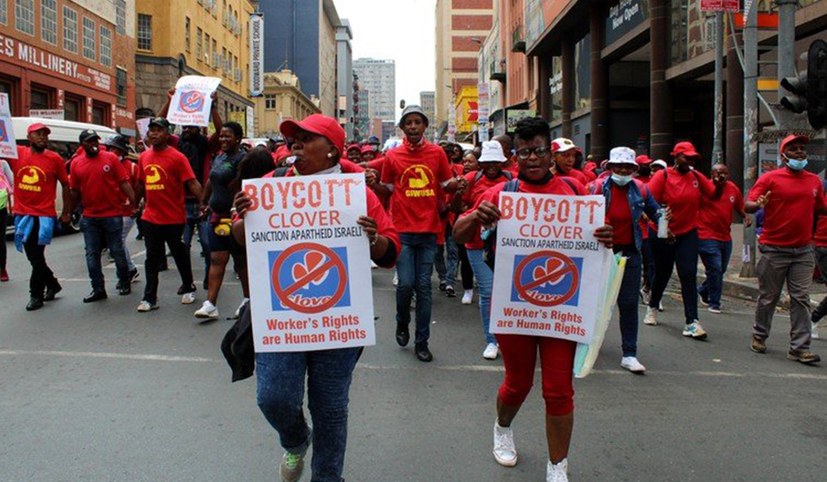Pickets and rallies were held in several cities in South Africa on Thursday January 27 in support of the increasingly popular demand to nationalize Clover, South Africa’s largest dairy sector employer. 5,000 of its workers, led by the General Industries Workers Union of South Africa (GIWUSA) and the Food and Allied Workers Union (FAWU), have been on strike since November 22, 2021. Mobilizations were also held in solidarity in cities across the world.
Several other trade unions affiliated to the left-wing South African Federation of Trade Unions (SAFTU), including the National Union of Metalworkers of South Africa (NUMSA), took part in mobilizations in solidarity with the workers who for two months have been on strike in protest against mass-retrenchments.
The long struggle against Clover
Clover was bought by the Milco consortium in 2019. Milco had assured the Competition Tribunal of South Africa at the time that no jobs would be shed as a result of the merger. On the contrary, they assured that 550 new jobs will be created.
However, unions allege, over 800 workers have already been forced to opt for voluntary severance packages (VSPs), because their workplaces were relocated from inland regions to expensive coastal cities where they cannot afford to survive on the wages they earn.
The strike began after the company issued retrenchment (Section 189A) notices, in which, according to the unions, Clover has stated its intention to carry out restructuring, which would result in 1,418 job-losses.
Arguing that these retrenchments are a violation of the conditions laid down by the Competition Tribunal while permitting the merger of Clover and Milco, the unions have called for nationalization of Clover.
The closure of six plants since the merger has also been perceived as an attempt to destroy the production capacity of South African dairy, so as to open its market for imported dairy products of Milco, 60% of which is owned by the Israeli Central Bottling Company (CBC). This is seen as a threat to the interests of South Africa’s dairy farmers as well as consumers.
In response to the workers’ action, a successful boycott campaign against Clover products has been launched, with workers and civil society activists engaging store-owners and their consumers about the common threat posed by the restructuring underway in Clover. Many store-owners have enlisted their support for the boycott campaign and stopped stocking Clover’s products.
“Your enemy is the enemy of the Palestinian People”
A central point of the union’s opposition to Clover’s merger with Milco, in addition to opposition job losses, is that Milco is majority-owned by an Israeli company that is in violation of international law because it operates in occupied Palestinian territories. Unions have now called on the government to disinvest Milco from Clover.
“Your enemy is the enemy of the Palestinian People,” GIWUSA’s president Mametlwe Sebei said in his address to workers at mass-picket and demonstration outside Israel Trade and Economic offices in Sandton, Johannesburg.
“You are here because, under Milco, you are experiencing the dictatorship and brutality that until now we were hearing about, thousands of kilometers away in Palestine,” he added. Apart from economic retributions such as illegal cancellation of striking workers’ Christmas bonuses and arbitrary dismissals of hundreds of workers, unions allege that Clover is also responsible for petrol bomb attacks to intimidate workers.
“We are here today to tell you (Milco) that trading with you is a catastrophe. We don’t want to trade with you.. until the people of Palestine are free,” said FAWU’s Deputy General Secretary, Vuka Chonco.
“We are not going to build Israel’s economy, because if we build that economy, we are affording the Israel state to buy more guns and ammunition to kill Palestinian people. We will not fund them,” he added. Similar sentiments echoed from other pickets, including in Cape Town and in Polokwane in Limpopo province.
Finding common cause, the pro-Palestine organizations such as the Palestinian Solidarity Alliance (PSA), Palestine Solidarity Campaign (PSC) and the Boycott, Divestment and Sanctions movement (BDS) have been actively mobilizing support for the workers’ strike to protect their jobs and the South African dairy sector’s productive capacity by nationalizing Clover.
Demonstrations of solidarity abroad
These organizations have also played a crucial role in internationalizing the struggle. “We’re here today protesting outside the South African High Commission in London.. in solidarity with all the workers on strike in Clover,” Claire Rosa Laker-Mansfield of the Socialist Alternative of England, Wales and Scotland said through a megaphone from outside the embassy.
“This parasitic Israeli company which has taken over Clover plants is attempting to drive down the conditions of the workers and throwing thousands out of their jobs. And it is doing so in order to make a profit and create new market for a company which, up until now, has failed to sell a huge number of goods in South Africa, because of the solidarity that is felt there with the Palestinian people and their struggle.”
Demonstrations of solidarity with the common cause of Clover workers and Palestinian people also came from several countries including Austria, Brazil, Israel, Sweden, US, the UK, Canada, Austria, Belgium and Nigeria.
This successful demonstration of strength and support on the “National and International Day of Action in solidarity with striking Clover workers”, is bound to weigh in on the calculations of the South African government. Its representatives are expected to sit with the unions and the company’s management for negotiations on Saturday, January 28.





